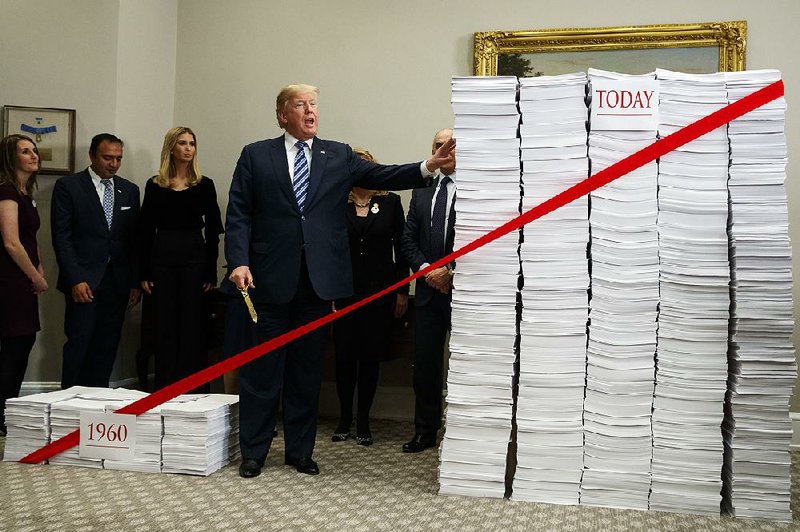WASHINGTON -- President Donald Trump said Thursday that his administration was answering "a call to action" by rolling back regulations on environmental protections, health care, financial services and other industries as he made a push to showcase his accomplishments near the end of his first year in office.
The remarks highlighted an area where Trump has perhaps done more to change the policies of his predecessor than any other, with regulatory shifts that have affected wide swaths of the economy.
"We are just getting started," Trump said, speaking from the Roosevelt Room of the White House. He described progress so far as the "most far-reaching regulatory reform" in U.S. history, a claim he did not back up.
"We have decades of excess regulation to remove," he added. "To help launch the next phase of growth, prosperity and freedom, I am challenging my Cabinet to find and remove every single outdated, unlawful and excessive regulation on the books."
[PRESIDENT TRUMP: Timeline, appointments, executive orders + guide to actions in first 200 days]
Echoing his days as a real estate developer with the flair of a groundbreaking, Trump used an oversized pair of scissors to cut a ribbon his staff had set up in front of two piles of paper, representing government regulations in 1960 -- 20,000 pages, he said -- and today, a pile that was about 6 feet tall and said to be 185,000 pages.
His efforts have brought cheers from the business community, most notably from companies that will benefit from the rollbacks.
But they have also generated fierce push-back from state attorneys general and environmental groups, who say that pulling back regulations has left the environment more vulnerable to pollution and consumers with fewer of the protections that were adopted after the financial crisis.
The president said that for every new regulation adopted, his administration has killed 22, a claim that some experts in regulation said was difficult to verify but which he said was far more than the two rules killed for each new one that he pledged earlier this year.
The president also said little about the impact of his actions, which have created opportunities for regulated industries that supported his campaign -- and that in many cases have played a direct role in orchestrating the changes through their lobbying efforts.
In no part of government have the consequences of Trump's efforts to reverse the actions of President Barack Obama's administration been more apparent than in the Environmental Protection Agency. But the reach of the actions were pronounced even on Thursday, when the Federal Communications Commission voted to repeal Obama administration regulations known as Net neutrality, which prohibit Internet service providers from blocking or charging websites for higher-quality service.
Still, several economic indicators -- and comments from companies large and small -- suggest that a shift in federal regulatory policy is building business confidence and accelerating economic growth.
While Trump spoke of the rollback with superlatives, he has exaggerated the overall impact. In several cases, state attorneys general or environmental groups have been able to stop the immediate rollbacks and the ultimate outcome may be decided in federal courts, where his administration faces dozens of legal challenges.
"This is certainly indicative of an attitude toward public pronouncements that comes from the top of the administration to maximize accomplishments and exaggerate them as much as possible," said Stuart Shapiro, a professor at Rutgers University who served from 1998 to 2003 in the Office of Information and Regulatory Affairs under Republican and Democratic administrations.
Xavier Becerra, the California attorney general, has filed at least seven lawsuits to challenge what he considers illegal attempts by the Trump administration to delay or repeal regulations that protect the environment, students and public health. Federal judges have already ruled in favor of Becerra in at least two of these cases.
The most permanent part of the regulatory rollback -- with Trump's support -- has come via acts of Congress, which used a power known as the Congressional Review Act to eliminate more than a dozen Obama administration initiatives, including one that was intended to prevent people with mental disabilities from buying guns. The review act, which had been used only once before the Trump administration, can nullify federal regulations for 60 legislative days after they have been finalized with a simple majority vote.
But as the documents released Thursday show, individual federal agencies have heard the White House's call to reconsider a broad array of regulations, even though these agencies must undergo a time-consuming process to repeal any rule.
Coal mining has been an area of particular attention.
The EPA, in addition to moving to reconsider an Obama administration climate-change rule that would have effectively forced the shutdown of dozens of coal-burning power plants, has separately moved to reconsider a rule that requires new precautions for the disposal of coal ash, a step taken after a series of accidents involving coal-ash ponds.
The agency also has separately moved to delay the implementation of a rule intended to prevent damage to aquatic life as a result of water discharges from power plants, including those that burn coal. Congress repealed a measure intended to preve
nt coal mining from destroying area streams.
A Section on 12/15/2017
